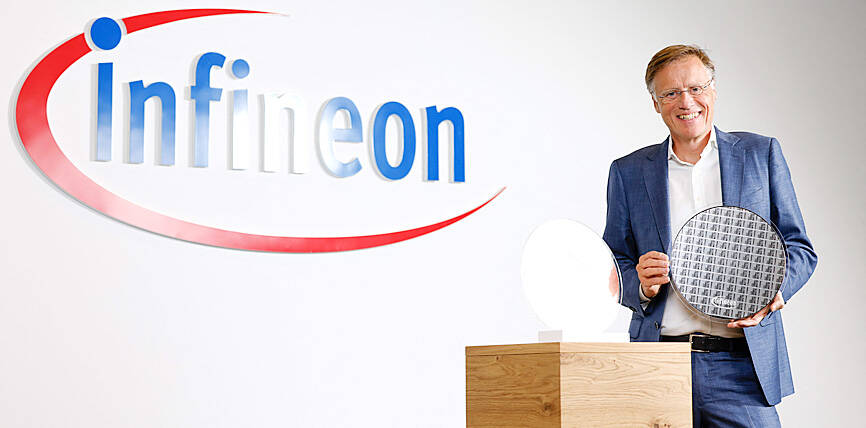German semiconductor maker Infineon Technologies AG yesterday said its part-acquisition of US firm Marvell Technology Inc would better position it to supply firms working on technologies of the future, including humanoid robots.
Infineon plans to buy the automotive division of the US rival for US$2.5 billion (2.3 billion euros) to profit from its ethernet technology, the company said in a statement late on Monday.
“It strengthens our digital control connectivity part of the company,” Infineon CEO Jochen Hanebeck said on a call for analysts yesterday.

Photo: Michaela Stache, AFP
“The combination is what makes the difference,” he added, giving the example of humanoid robots that need a variety of components, including ethernet cables.
Several hundred Marvell employees will join Infineon, which employs 58,000 people worldwide, the German company said, noting that the acquisition would “strengthen Infineon’s already strong footprint in the US.”
Marvell’s ethernet allows for the transfer of the large volumes of data needed to power software systems in cars and potentially other devices such as robots, Infineon said.
The business was expected to generate revenue of US$225 million to US$250 million for this year and would have a gross margin of 60 percent, Infineon said.
It added that Marvell’s automotive ethernet business had about US$4 billion of orders in the pipeline.
German manufacturers struggle with high energy and labor costs at home and, to sell into the US, now face the added costs of swingeing tariffs imposed last week by US President Donald Trump on dozens of trade partners.

STEEP DECLINE: Yesterday’s drop was the third-steepest in its history, the steepest being Monday’s drop in the wake of the tariff announcement on Wednesday last week Taiwanese stocks continued their heavy sell-off yesterday, as concerns over US tariffs and unwinding of leveraged bets weighed on the market. The benchmark TAIEX plunged 1,068.19 points, or 5.79 percent, to 17,391.76, notching the biggest drop among Asian peers as it hit a 15-month low. The decline came even after the government on late Tuesday authorized the NT$500 billion (US$15.2 billion) National Stabilization Fund (國安基金) to step in to buoy the market amid investors’ worries over tariffs imposed by US President Donald Trump. Yesterday’s decline was the third-steepest in its history, trailing only the declines of 2,065.87 points on Monday and

TAKING STOCK: A Taiwanese cookware firm in Vietnam urged customers to assess inventory or place orders early so shipments can reach the US while tariffs are paused Taiwanese businesses in Vietnam are exploring alternatives after the White House imposed a 46 percent import duty on Vietnamese goods, following US President Donald Trump’s announcement of “reciprocal” tariffs on the US’ trading partners. Lo Shih-liang (羅世良), chairman of Brico Industry Co (裕茂工業), a Taiwanese company that manufactures cast iron cookware and stove components in Vietnam, said that more than 40 percent of his business was tied to the US market, describing the constant US policy shifts as an emotional roller coaster. “I work during the day and stay up all night watching the news. I’ve been following US news until 3am

Six years ago, LVMH’s billionaire CEO Bernard Arnault and US President Donald Trump cut the blue ribbon on a factory in rural Texas that would make designer handbags for Louis Vuitton, one of the world’s best-known luxury brands. However, since the high-profile opening, the factory has faced a host of problems limiting production, 11 former Louis Vuitton employees said. The site has consistently ranked among the worst-performing for Louis Vuitton globally, “significantly” underperforming other facilities, said three former Louis Vuitton workers and a senior industry source, who cited internal rankings shared with staff. The plant’s problems — which have not

TARIFF CONCERNS: The chipmaker cited global uncertainty from US tariffs and a weakening economic outlook, but said its Singapore expansion remains on track Vanguard International Semiconductor Corp (世界先進), a foundry service provider specializing in producing power management and display driver chips, yesterday withdrew its full-year revenue projection of moderate growth for this year, as escalating US tariff tensions raised uncertainty and concern about a potential economic recession. The Hsinchu-based chipmaker in February said revenues this year would grow mildly from last year based on improving supply chain inventory levels and market demand. At the time, it also anticipated gradual quarter revenue growth. However, the US’ sweeping tariff policy has upended the industry’s supply chains and weakened economic prospects for the world economy, it said. “Now